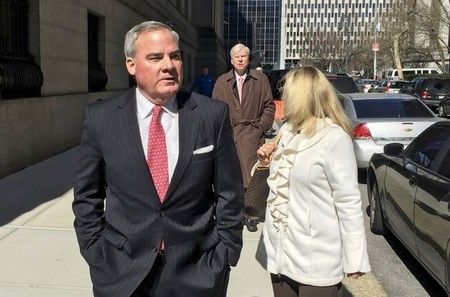Advertisement
Connecticut ex-Governor Rowland’s conviction upheld on appeal

By Nate Raymond
NEW YORK (Reuters) – A federal appeals court on Friday upheld former Connecticut Governor John Rowland’s conviction on charges that he tried to use sham contracts to hide his political work in two U.S. congressional campaigns.
The 2nd U.S. Circuit Court of Appeals in New York said Rowland, a Republican, was properly convicted over his role in creating documents that falsified his relationship with the candidates in order to impede a potential future investigation.
The three-judge panel also upheld Rowland’s 2-1/2 year prison sentence, and rejected his challenges to evidentiary rulings and jury instructions.
A lawyer for Rowland, who has been free on bail during the appeal, did not respond to requests for comment.
Rowland, 59, served as Connecticut’s governor from 1995 to 2004, when he resigned amid a corruption scandal. He spent 10 months in prison following his 2004 guilty plea linked to his accepting illegal gifts.
In the current case, a federal jury in New Haven in 2014 found Rowland guilty on seven counts of violating campaign-finance laws and falsifying records.
The case stemmed from what prosecutors said were Rowland’s efforts to secure consulting jobs with the congressional campaigns of Mark Greenberg in 2010 and Lisa Wilson-Foley in 2012.
Prosecutors said Rowland gave Greenberg a draft contract to have him paid through his business or charitable interests rather than the campaign, a deal Greenberg rejected.
Rowland later contacted Wilson-Foley and her husband, Brian Foley, who were concerned about connecting Wilson-Foley’s campaign to the felon ex-governor.
As a result, prosecutors said, they negotiated a deal in which Rowland would be hired by a nursing home company Foley owned.
On appeal, Rowland argued prosecutors went too far in trying to criminalize his conduct under the Sarbanes-Oxley Act of 2002, a law passed after Enron Corp’s collapse that prohibits falsifying documents to hide financial wrongdoing.
He argued the contracts at issue could not be considered “falsified” under the meaning of the statute because to “falsify” means tampering with pre-existing documents, not creating new ones.
But U.S. Circuit Judge Susan Carney pointed to dictionary definitions to conclude that “in common usage, it is acceptable to say that someone ‘falsifies’ a document when he creates a document that misrepresents the truth.”
Wilson-Foley and Foley pleaded guilty to conspiring to make illegal campaign contributions. Wilson-Foley received a five-month prison term, while Foley was sentenced to three months in a halfway house.
(Reporting by Nate Raymond in New York; additional reporting by Jonathan Stempel; Editing by Phil Berlowitz)











